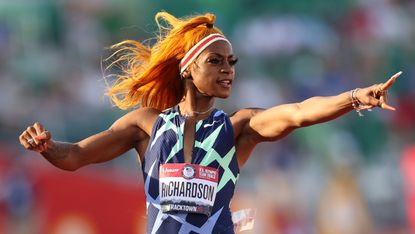Doping in sport: should cannabis be on the list of banned substances?
World Anti-Doping Agency will launch a scientific review next year

When US sprinter Sha’Carri Richardson missed the Tokyo Olympic Games after testing positive for a chemical found in cannabis, her suspension “reignited a long debate over marijuana prohibition in Olympic sports”, said the BBC’s Robin Levinson-King.
Considered a top contender for the 100m, Richardson tested positive during the US Olympic Track & Field trials in June and was given a one-month suspension. The 21-year-old said she had used cannabis as a way of coping with the death of her biological mother and not to boost performance. Her exclusion became a matter of “heated debate”, Scientific American reported at the time.
“Don’t judge me, because I am human, I just happen to run a little faster,” she told NBC’s Today show. “I apologise for the fact that I didn’t even know how to control my emotions or deal with that during that time.”
Subscribe to The Week
Escape your echo chamber. Get the facts behind the news, plus analysis from multiple perspectives.

Sign up for The Week's Free Newsletters
From our morning news briefing to a weekly Good News Newsletter, get the best of The Week delivered directly to your inbox.
From our morning news briefing to a weekly Good News Newsletter, get the best of The Week delivered directly to your inbox.
‘Substance of abuse’
The 2021 World Anti-Doping Code classifies tetrahydrocannabinol (THC) - the main psychoactive constituent of cannabis, marijuana, and hashish - as a “substance of abuse”, Inside The Games reported. Athletes found to use it outside of competition face a three-month ban, but in Richardson’s case it was reduced to 30 days by the United States Anti-Doping Agency as long as she also undertook a treatment programme.
With cannabis legal in many states across America, why is it still outlawed in sports, the BBC’s Levinson-King asks. “Given that its performance-enhancing properties are disputed, many wonder why cannabis should still be banned.”
Scientific review
Sign up for Today's Best Articles in your inbox
A free daily email with the biggest news stories of the day – and the best features from TheWeek.com
Richardson’s suspension sparked an outpouring of sympathy and calls for a review of anti-doping rules, The Guardian reported. And yesterday the World Anti-Doping Agency (Wada) announced it will launch a “scientific review” into cannabis’s status as a banned substance.
“Following receipt of requests from a number of stakeholders, the Executive Committee endorsed the decision of the List Expert Advisory Group to initiate in 2022 a scientific review of the status of cannabis,” Wada said in a statement. “Cannabis is currently prohibited in competition and will continue to be in 2022.”
Since Wada published its “prohibited list” in 2004, cannabinoids have been banned in all sports during competition. Drugs are prohibited if they meet two of three criteria: they harm the health of the athlete; are performance enhancing; are against the spirit of sport.
Create an account with the same email registered to your subscription to unlock access.
-
 'Elevating Earth Day into a national holiday is not radical — it's practical'
'Elevating Earth Day into a national holiday is not radical — it's practical'Instant Opinion Opinion, comment and editorials of the day
By Harold Maass, The Week US Published
-
 UAW scores historic win in South at VW plant
UAW scores historic win in South at VW plantSpeed Read Volkswagen workers in Tennessee have voted to join the United Auto Workers union
By Peter Weber, The Week US Published
-
 Today's political cartoons - April 22, 2024
Today's political cartoons - April 22, 2024Cartoons Monday's cartoons - dystopian laughs, WNBA salaries, and more
By The Week US Published
-
 The 'Enhanced Games': a dangerous dosage?
The 'Enhanced Games': a dangerous dosage?Talking Point A drug-fuelled Olympic-style competition is in the works but critics argue the risks are too high
By Sorcha Bradley, The Week UK Published
-
 2023 Fifa Women’s World Cup: fixtures, groups and UK TV coverage
2023 Fifa Women’s World Cup: fixtures, groups and UK TV coveragefeature Tournament in Australia and New Zealand will be broadcast live on the BBC and ITV
By Mike Starling Last updated
-
 ‘Genuine visionary’: is Pep Guardiola the greatest of all time?
‘Genuine visionary’: is Pep Guardiola the greatest of all time?feature Spaniard has now won two trebles following Man City’s Champions League triumph
By The Week Staff Published
-
 Champions League final: Man City vs. Inter predictions and preview
Champions League final: Man City vs. Inter predictions and previewfeature Can Guardiola’s team finally win the Champions League and complete a historic treble?
By Mike Starling Last updated
-
 Luton Town’s extraordinary ‘resurrection’
Luton Town’s extraordinary ‘resurrection’feature The Hatters complete a fairy tale rise from non-league to the Premier League
By The Week Staff Published
-
 Man City: can ‘one of the best sides in history’ win the treble?
Man City: can ‘one of the best sides in history’ win the treble?feature Guardiola’s Premier League champions have two more trophies in their sights
By The Week Staff Published
-
 Michael Smith’s nine-darter: how darts fans reacted to the ‘greatest leg of all time’
Michael Smith’s nine-darter: how darts fans reacted to the ‘greatest leg of all time’feature It was a magical night for Smith as he beat Michael van Gerwen to win first world title
By Mike Starling Published
-
 Where will Cristiano Ronaldo go next?
Where will Cristiano Ronaldo go next?feature Portugal captain has been linked with a mega-money move to Saudi Arabia
By Mike Starling Last updated